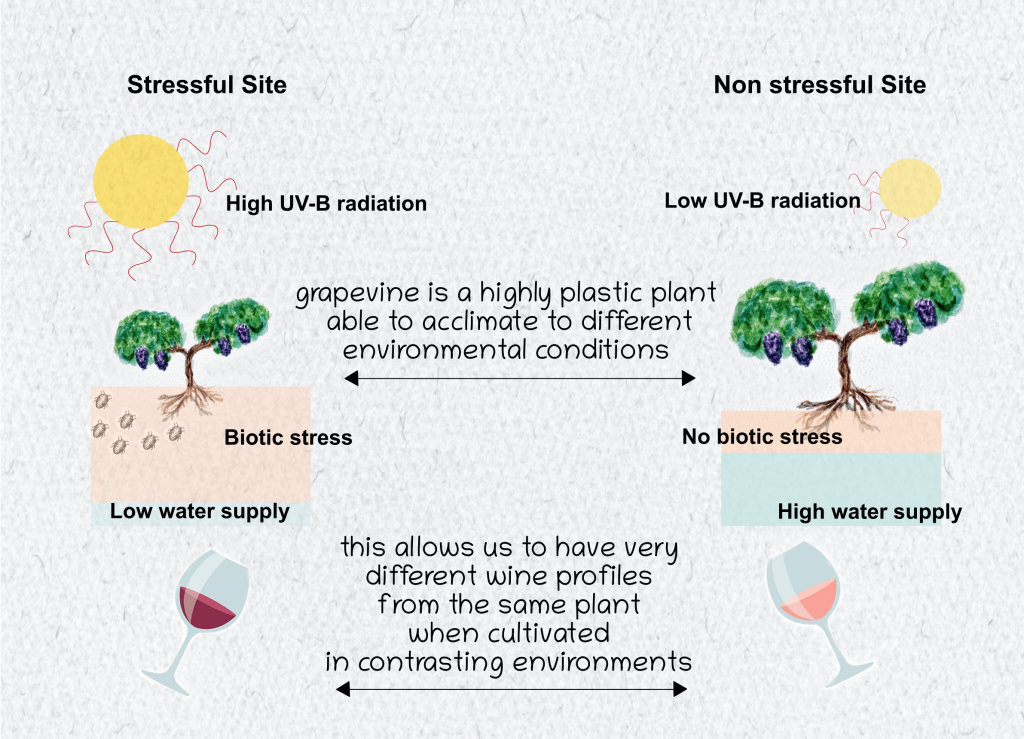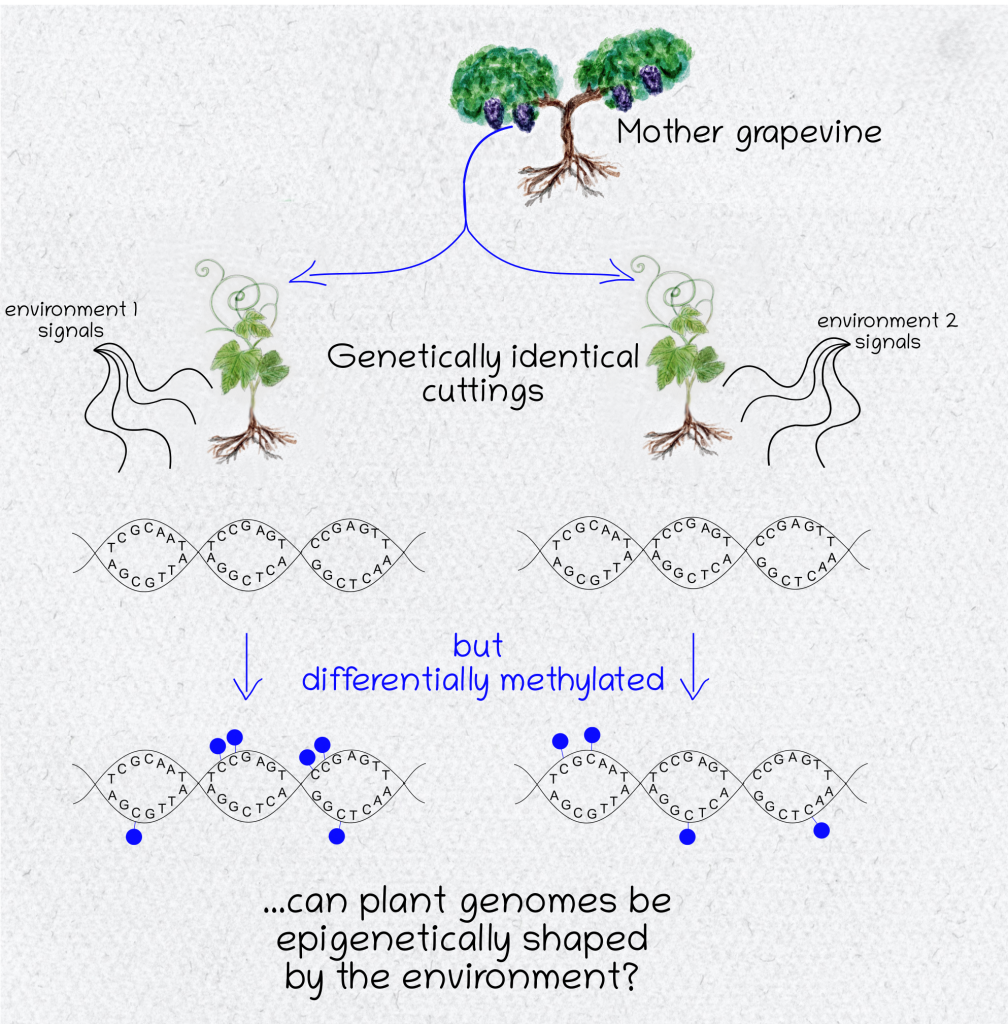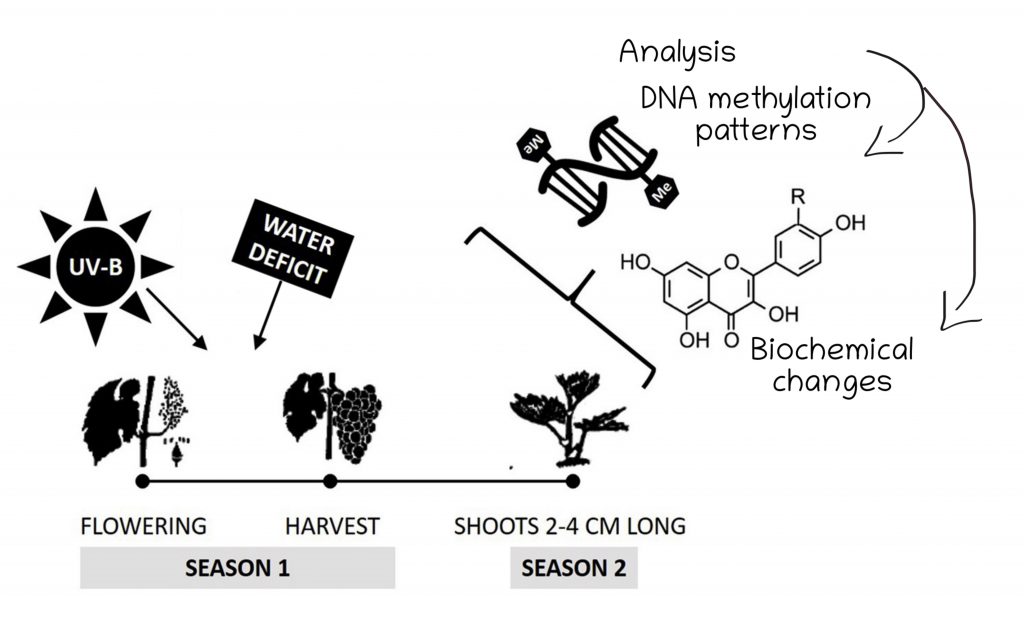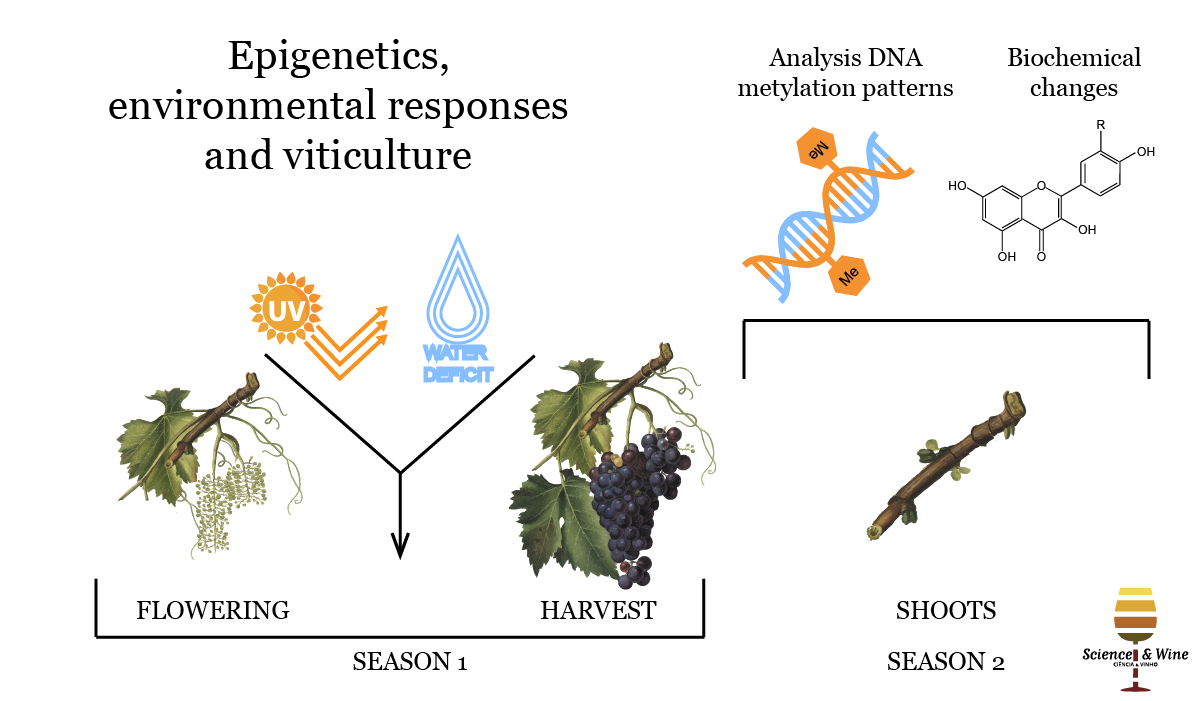By Anabella Varela, Federico Berli, Carlos Marfil and Verónica Noé Ibañez
Since plants as sessile organism cannot escape from stressful environmental conditions they have developed morphophysiological and biochemical adjustments (phenotypes), as the result of short-term gene expression changes (Atkinson and Urwin, 2012) and epigenetic modifications like DNA methylation (Jablonka and Raz, 2009). The ability of an organism to express diverse phenotypes in different environments is called phenotypic plasticity. This plasticity is part of acclimation processes, which prevent plants from dying and enable plant production in diverse environments. Grapevine possess high phenotypic plasticity allowing it to grow in very contrasting environments around the world.
Epigenetic modifications refer to heritable and reversible changes in gene expression (which afterwards may lead to changes in the phenotype) without changes in the DNA sequence. This definition has two important concepts. First, that heritable changes in gene expression may play a role in phenotypic plasticity (Zhang et al., 2013) which in line to what we said above, increase the acclimation of plants to various abiotic and biotic factors (Johannes et al., 2009). Secondly, since these modifications happens without changes in the DNA sequence, two grapevines clones originated from the same mother can still present phenotypic differences. The late concept takes special relevance from an oenological point of view, since berry and wine composition (quality) can be associated with a wine region or specific vineyard, concept known as terroir that involves plant material (genotype), environmental conditions and management characteristics (Van Leeuwen et al., 2004).

We present some important findings recently published by our research group from the Instituto de Biología Agrícola de Mendoza, CONICET-Universidad Nacional de Cuyo, Argentina, in collaboration with the Catena Institute of Wine, Bodega Catena Zapata. The paper by Marfil et al. (2019) evaluates whether different environmental signals induce DNA methylation changes in the Malbec genome, the emblematic variety of Argentine viticulture. Also, correlate this epigenetic mechanism with the variability observed in sensory quality compounds such as polyphenols, and study to what extent this epigenetic characteristic is inherited as part of an acclimation mechanism.
The experiment was conducted during two growing seasons in field grown Vitis vinifera L. cv. Malbec plants exposed to contrasting ultraviolet-B radiation (UV-B; minus UV-B vs. high UV-B) and water regimes (well-watered vs. water deficit). These environmental signals were chosen because are common in our local environmental conditions. Mendoza is the main wine region of Argentina, having high-altitude vineyards reaching up to 1400 m a.s.l. These vineyards cultivated with elevated UV-B levels are drip irrigated and produce deep and colorful red wines. Both components are considered within the terroir concept, i.e. UV-B, as an abiotic factor, and water restriction, as both an abiotic factor and a management practice.


High UV-B and water deficit were the treatments that induced greater number of DNA methylation changes respect to Control (minus UV-B and well-watered). In addition, high UV-B was associated with flavonols accumulation, suggesting that DNA methylation could regulate sensory quality compounds accumulation and participate in acclimation mechanisms.
Highlight
- Solar ultraviolet-B radiation (UV-B) and water deficit induce grapevine DNA methylation changes
- UV-B is associated with flavonols accumulation in berries and early fruit shoots
- Flavonol response to UV-B can be DNA methylation dependent and inherited
Those interested in a longer length report can download the working paper at:
https://www.sciencedirect.com/science/article/pii/S0981942818305680

Anabella Varela
Masters degree in Vititulture and Oenology in the University of Padova, Udine and Verona. PhD student working on Vitis vinifera epigenetics in the Instituto de Biología Agrícola de Mendoza, CONICET-Universidad Nacional de Cuyo, Argentina. Advisors: Carlos Marfil and Federico Berli.

Federico Berli
Professor of Plant Biochemistry and Researcher in the Instituto de Biología Agrícola de Mendoza, CONICET-Universidad Nacional de Cuyo, Argentina. His research is focused on the effects of environmental factors on the grapevine physiology. He is author of 21 papers in international scientific journals. Mail: fberli@fca.uncu.edu.ar

Carlos Marfil
Professor of Genetics and Researcher in the Instituto de Biología Agrícola de Mendoza, CONICET-Universidad Nacional de Cuyo, Argentina. We develop researches related to the study of epigenetic variability as a source of phenotypic novelties in plants: we are interested in describing factors that generate epigenetic variability and the stability and importance of this variability in processes of acclimatization, adaptation and plant diversification. To study the environmental induced epigenetic variation we use as experimental models germplasm from agro-ecosystems (vine) and from natural ecosystems (wild potato species).

Verónica Noé Ibañez
Agricultural engineer, from the National University of Cuyo. PhD student in the Instituto de Biología Agrícola de Mendoza, CONICET-Universidad Nacional de Cuyo, Argentina. Her research is focused on environmental induced epigenetic variation under natural conditions in Solanum kurtzianum, the argentine wild potato best adapted to desert regions. Advisors: Carlos Marfil.
References:
- Atkinson, N.J., Urwin, P.E., 2012. The interaction of plant biotic and abiotic stresses: from genes to the field. J. Exp. Bot. 63, 3523–3544.
- Jablonka, E.V.A., Raz, G.A.L., 2009. Transgenerational epigenetic inheritance: pre- valence, mechanisms, and implications for the study of heredity and evolution. Q. Rev. Biol. 84, 131–176.
- Johannes, F., Porcher, E., Teixeira, F.K., Saliba-Colombani, V., Simon, M., Agier, N., Bulski, A., Albuisson, J., Heredia, F., Audigier, P., 2009. Assessing the impact of transgenerational epigenetic variation on complex traits. PLoS Genet. 5 e1000530- e1000530.
- Marfil C., Ibañez V., Alonso R., Varela A., Bottini R., Masuelli R., Fontana A., Berli F., 2018. Changes in grapevine DNA methylation and polyphenols content induced by solar ultraviolet-B radiation, water deficit and abscisic acid spray treatments. Plant Physiol. Biochem. 135, 287–294.
- Van Leeuwen, C., Friant, P., Choné, X., Tregoat, O., Koundouras, S., Dubourdieu, D., 2004. Influence of climate, soil, and cultivar on terroir. Am. J. Enol. Vitic. 55, 207–217.
- Zhang, Y.Y., Fischer, M., Colot, V., Bossdorf, O., 2013. Epigenetic variation creates po- tential for evolution of plant phenotypic plasticity. New Phytol. 197, 314–322.

